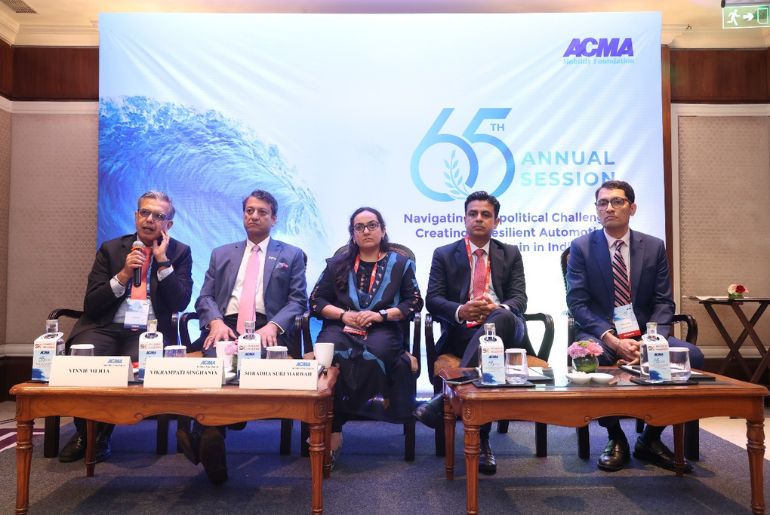The Automotive Component Manufacturers Association of India (ACMA), the apex body representing India’s auto component industry, hosted its 65th Annual Session in New Delhi under the theme “Navigating Geopolitical Challenges – Creating a Resilient Automotive Supply Chain in India.” The high-level event brought together senior policymakers, global leaders, and industry executives to deliberate on strengthening India’s position in global mobility supply chains.
The session was marked by the release of the ACMA–McKinsey Study on ‘Shaping the Future of India’s Auto Component Industry amid Global Trade Shifts’, which projects the industry to scale to USD 200 billion by 2030. The study cites robust domestic demand, a growing export base, and opportunities in both internal combustion engine (ICE) components and next-generation EV and connected solutions as key drivers. However, it also highlighted risks such as tariffs, carbon taxes, and over-reliance on rare earths and semiconductors.
Addressing the session, Shradha Suri Marwah, President of ACMA and CMD of Subros Ltd., noted the sector’s strong growth trajectory, with revenues surpassing $80 billion in FY25 and exports crossing $23 billion. She emphasised the need for resilience amid geopolitical challenges, technology disruptions, and sustainability imperatives.
Government leaders highlighted ongoing policy support for the industry. H.D. Kumaraswamy, Minister of Heavy Industries & Steel, pointed to the success of the PLI scheme, which has attracted over ₹29,500 crore in investments and generated more than 45,000 jobs. He also underlined the PM-eDRIVE programme as a catalyst for accelerating e-mobility across vehicle segments.
Nitin Gadkari, Minister of Road Transport & Highways, outlined a vision to make India a global hub for smart, safe, sustainable, and affordable mobility by 2030, emphasising the adoption of clean fuels including electricity, hydrogen, ethanol, biofuels, LNG, and CNG.
Piyush Goyal, Minister of Commerce & Industry, reaffirmed India’s role as a reliable global trade partner, noting that India and the EU are working towards a balanced Free Trade Agreement (FTA). He also welcomed the reduction of GST on auto parts to 18 per cent, aimed at formalising supply chains and driving growth.
From a global perspective, H.E. Maroš Šefčovič, European Commissioner for Trade and Economic Security, stressed the importance of India–EU collaboration, highlighting opportunities for joint innovation, resilient supply chains, and climate action through a fair trade framework.
The event saw participation from over 1,200 delegates, including top officials, OEMs, suppliers, diplomats, and international stakeholders, cementing ACMA’s role as the voice of India’s auto component sector in global industry dialogues.

